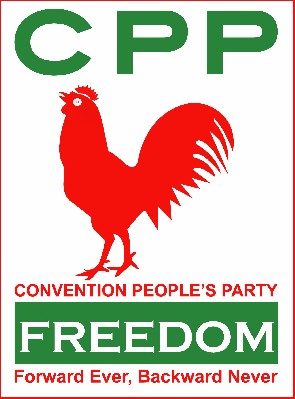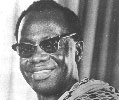Related Research Articles

The area of the Republic of Ghana became known in Europe and Arabia as the Ghana Empire after the title of its Emperor,the Ghana. Geographically,the ancient Ghana Empire was approximately 500 miles (800 km) north and west of the modern state of Ghana,and controlled territories in the area of the Sénégal River and east towards the Niger rivers,in modern Senegal,Mauritania and Mali. The empire appears to have broken up following the 1076 conquest by the Almoravid General Abu-Bakr Ibn-Umar. A reduced kingdom continued to exist after Almoravid rule ended,and the kingdom was later incorporated into subsequent Sahelian empires,such as the Mali Empire. Around the same time,south of the Mali empire in present-day northern Ghana,the Kingdom of Dagbon emerged. The decentralised states ruled by the tindaamba were unified into a kingdom. Many sub-kingdoms would later arise from Dagbon including the Mossi Kingdoms of Burkina Faso and Bouna Kingdom of Ivory Coast. Dagbon pioneered Ghana's earliest learning institutions,including a university town,and a writing system prior to European arrival.
Lieutenant General Akwasi Amankwaa Afrifa was a Ghanaian soldier,farmer,traditional ruler and politician. He was the head of state of Ghana and leader of the military government in 1969 and then chairman of the Presidential Commission between 1969 and 1970. He continued as a farmer and political activist. He was elected a member of Parliament in 1979,but he was executed before he could take his seat. He was executed together with two other former heads of state,General Kutu Acheampong and General Fred Akuffo,and five other generals,in June 1979. He was also popularly referred to by his title Okatakyie Akwasi Amankwaa Afrifa and was in addition the abakomahene of Krobo in the Asante-Mampong Traditional Area of the Ashanti Region of Ghana.

The Convention People's Party (CPP) is a socialist political party in Ghana based on the ideas of the first President of Ghana,Kwame Nkrumah. The CPP was formed in June 1949 after Nkrumah broke away from the United Gold Coast Convention (UGCC).

The Ashanti Region is located in the southern part of Ghana and is the third largest of 16 administrative regions,occupying a total land surface of 24,389 km2 (9,417 sq mi) and making up 10.2 percent of the total land area of Ghana. It is the most populated region in Ghana,with a population of 5,440,463 according to the 2021 census,accounting for around one-fifth of Ghana's total population. The Ashanti Region is known for its gold bar and cocoa production. The largest city and capital of Ashanti is Kumasi.

Kofi Abrefa Busia was a Ghanaian political leader and academic who was Prime Minister of Ghana from 1969 to 1972. As a nationalist leader and prime minister,he helped to restore civilian government to the country following military rule. He declared support for apartheid South Africa's white minority government.

Prempeh College is a public secondary boarding school for boys located in Kumasi,the capital city of the Ashanti Region,Ghana. The school was founded in 1949 by the Asanteman traditional authority,the British Colonial Government,the Methodist Church Ghana and the Presbyterian Church of Ghana. The school is named after the King of Ashanti (Asantehene),Sir Osei Tutu Agyeman Prempeh II,who donated the land on which the school was built,and was modeled on Eton College in England.
Asokore Mampong is the capital of the Asokore Mampong Municipal Assembly,a district in the Ashanti Region of Ghana. Popularly known for Kumasi Academy a senior high school and the SSNIT affordable housing projects. The chief of Asokore Mampong is Nana Boakye-Ansah Debrah.
Nicholas Yaw Boafo Adade (1927–2013) was a former supreme court judge and Attorney General of the Republic of Ghana. He was the Attorney General of Ghana between 14 April 1969 to 1970 in the Busia government. He was also Member of Parliament for Asante Akim South constituency in the 2nd Ghanaian Republic.
Jatoe Kaleo (1928–1998) was a Ghanaian traditional ruler,politician and founding member of the Northern Peoples Party.
Akumfi Ameyaw Munufie was a lawyer,politician and a Ghanaian diplomat. He was the minister of Social Development and later minister of Rural Development and Social Welfare in the second republic,he was Ghana's ambassador to Côte d'Ivoire in the fourth republic.
Patrick Kwame Kusi Quaidoo (1924-2002) was a Ghanaian politician and businessman. He served in various ministerial portfolios in the first republic and also served as a member of parliament in the first and second republic. He was the founder of the Republican Party and a founding member and leader of the All People's Republican Party.
Solomon Osei-Akoto was a Ghanaian politician. He was member of parliament for Birim-Abirem from 1969 to 1972 and also served as ministerial secretary for transport and communication under the Busia regime.
Alexander Apeatu Aboagye da Costa was a Ghanaian lawyer and politician. He was the deputy minister for Youth and Rural Development,and deputy minister for Labour and Co-operative during the second republic
Akenten Appiah-Menka was a Ghanaian lawyer,politician and businessman. He was the deputy minister for trade and industry and later deputy attorney general in the second republic.
Joseph Godson Amamoo is a Ghanaian former journalist,academic,foreign service worker,and politician. He once served as editor for the Ghanaian Times,a lecturer,Ghana's ambassador to Hungary and also as a deputy minister for Health,and later deputy minister of Lands and Minerals Resource in the Second Republic.
John Kofi Fynn was a Ghanaian academic and politician. He was an emeritus professor of history at the University of Ghana and a deputy minister of state in the Busia government. He served as deputy minister for local government and administration and later deputy minister for education.
Alfred Augustus Akainyah (1907–1988) was a Ghanaian lawyer and jurist. He was a barrister-at-law and a Supreme Court Judge during the first republic.
Kofi Gyemfi II was a Ghanaian politician,ex-serviceman,and hotelier. He was a member of the Parliament of Ghana for Atwima Amansie during the first Parliament of the Second Republic of Ghana. He served in the Ghana Armed Forces during World War II and managed and owned various hotels throughout his life.
Kofi Badu was a Ghanaian politician and journalist. He served as a member of parliament during Ghana's first republic and a minister of state during the Supreme Military Council (SMC) era and the Armed Forces Revolutionary Council (AFRC) era. As a journalist,he was editor for various newspapers.
References
- 1 2 "Ghana Year Book 1971". Graphic Corporation. 1971: 203.
{{cite journal}}: Cite journal requires|journal=(help) - 1 2 Bernasko, F. G. (2002). The republics that fell by the gun: the 1966 military intervention in Ghana and Nigeria revisited. p. 234.
- 1 2 "Daily report, foreign radio broadcasts". United States. Central Intelligence Agency. 1965: 1.
{{cite journal}}: Cite journal requires|journal=(help) - ↑ Harvey, W. B. (1966). Law and Social Change in Ghana. p. 243. ISBN 9781400875580.
- ↑ "Ghana Today, Volume 8". Information Section, Ghana Office. 1964: 6.
{{cite journal}}: Cite journal requires|journal=(help) - ↑ "The Ghana Law Reports, Part 2". Council for Law Reporting. 1963: 469.
{{cite journal}}: Cite journal requires|journal=(help) - ↑ "West Africa, Issues 2561-2587". West Africa Publishing Company Limited. 1966: 1371.
{{cite journal}}: Cite journal requires|journal=(help) - ↑ Howell, T. A. (1972). Ghana & Nkrumah. p. 105. ISBN 9780871961914.
- ↑ Christenson, Ron (1991). Political Trials in History: From Antiquity to the Present. p. 4. ISBN 9781412831253.
- ↑ Information Division of the Ghana High Commission., London (1963). Treason Trial: The State Versus Robert Benjamin Otchere, Joseph Yaw Manu, Tawia Adamafio, Ako Adjei, Hugh Horatio Cofie-Crabbe; Full Text of Opening Address by Attorney-General at the High Court (Special Criminal Division) in Accra on 9.8.1963.
- ↑ "The Legon Observer, Volume 4, Issues 18-26". Legon Society on National Affairs. 1969: 8.
{{cite journal}}: Cite journal requires|journal=(help) - ↑ "Record of Proceedings - International Labour Conference, Volumes 54-55". International Labour Office. 1970: xxii.
{{cite journal}}: Cite journal requires|journal=(help) - ↑ "West Africa, Issues 2718-2743". West Africa Publishing Company Limited. 1971: 54.
{{cite journal}}: Cite journal requires|journal=(help)